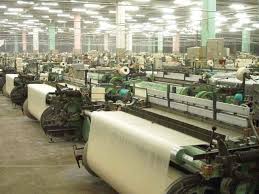Crisis-stricken textile industry, the 55pc contributing sector in the country’s export, has requested State Bank of Pakistan (SBP) to reschedule/restructure the loan for the revival of sick units to avoid further decline in production and exports.
On the request of the textile sector, the SBP and the commercial banks may extend the facility in order to revive the factories running short of their capacity, sources at the textile industry told Pakistan Today. Apart from representatives of textile sector, Senate Standing Committee on Textile had also directed the SBP to play its role and facilitate among non-wilful textile defaulters and banks for the revival/rehabilitation of sustainable sick textile units by restructuring and rescheduling of their loans on an urgent basis.
After the Senate Committee’s meeting with SBP Governor Ashraf Mahmood Wathra in January this year, the SBP had recently held a meeting on the same issue in Karachi to look into possibilities of supporting the textile industry, the sources claimed. However, the SBP and other banks did not share the progress on the matter. Wathra earlier had asked the commercial banks to play their due role in the rehabilitation of the textile industry by extending soft loans to exporters.
However, the banking sector was concerned about the increasing non-competitiveness of the textile industry, already defaulting loans to the banks. The banks were also worried about the loan they provided to the textile sector, in case the ailing units stop functioning.
Spokesperson of SBP, when contacted, said “A meeting of the Senate Standing Committee on textile was held on January 03, 2017 at the State Bank of Pakistan to discuss rescheduling/restructuring of defaulted loans of sick textile units. In the meeting, it was decided that SBP will be playing a facilitating role and will oversee whether the restructuring decisions are taken on merit and in the best interests of banks and borrowers both. A senior SBP official will serve as a focal person to facilitate the restructuring of defaulted loans of sick textile units. In this regard, preliminary meetings with representatives of textile mills and banks have already been held, advising the banks to only consider restructuring of those units which can be revived on a sustainable basis.”
Due to the defaults, the banks have withdrawn their credit facilities, which have further aggravated the situation and would increase non-performing loans (NPLs) of the banks for the textile sector. According to officials at SBP, out of total advances of Rs728 billion, NPLs are more than Rs198 billion (including the textile sector) which is 27pc of the total portfolio.
The increasing cost of production has made the textile industry uncompetitive, as witnessed by the decline in exports and closures of textile mills across the country.
Talking to Pakistan Today, Chairman Senate Standing Committee on Textile Senator Mohsin Aziz said that the Governor SBP was asked by the committee to consider the request of textile industry and facilitate the sick units running at an average capacity of 20 to 30 pc. “We are yet to receive any response from the SBP and banks in this regard,” he said, adding that reviving the ailing units were needed to break the declining export trend of the textile sector, which caters 55pc of the total exports of Pakistan, generating 40pc jobs in the manufacturing sector and contributing 9 to 10pc to the GDP.




